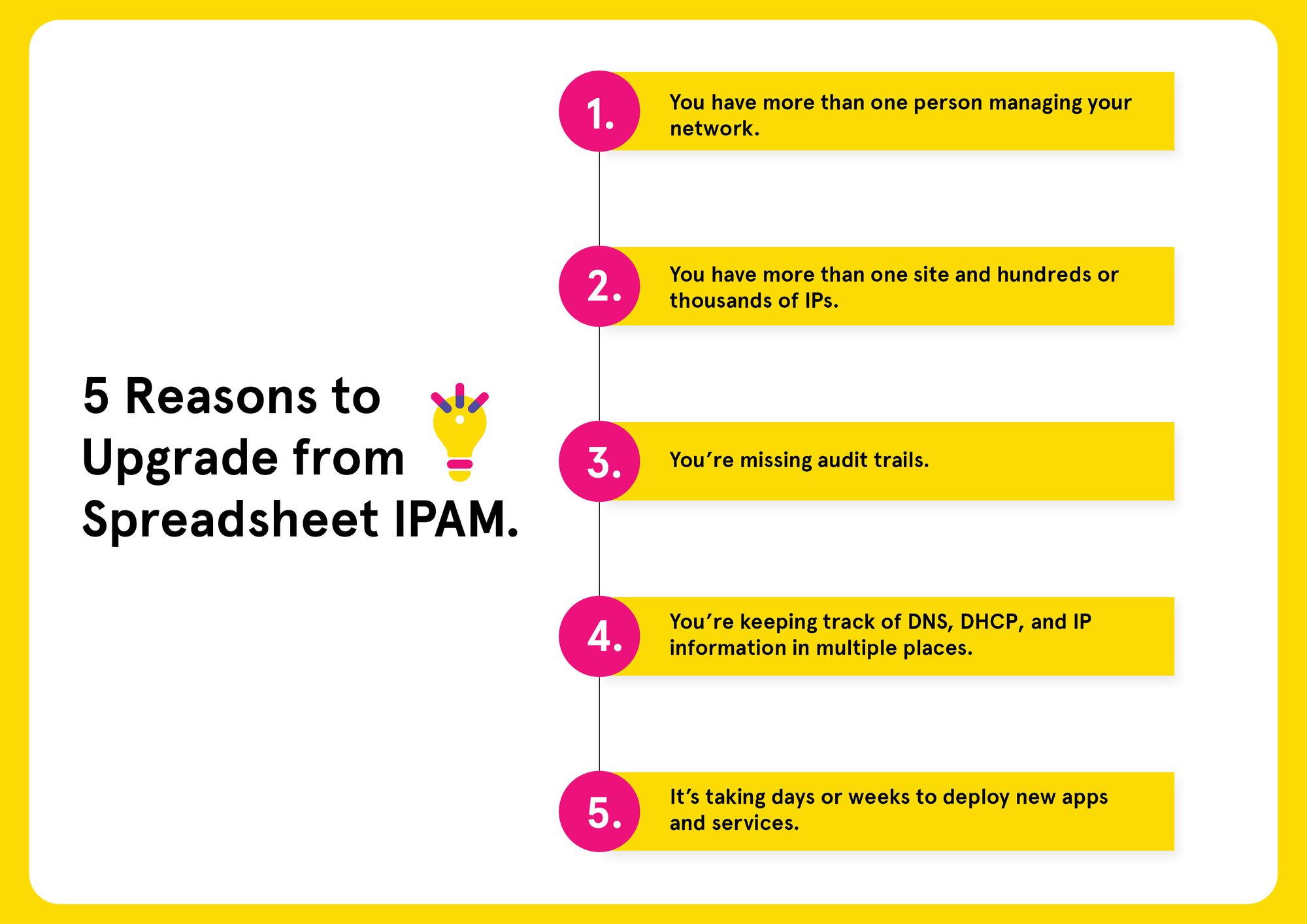5 Reasons to Upgrade from Spreadsheet IPAM
Using DDI Network Management Solutions to Make Your Network Stable and Consistent
Nov 18th, 2021
IP Address Management is more difficult than it looks. Using a dedicated IPAM or DNS, DHCP, and IPAM (DDI) solution can make it much more sustainable. The question you should ask yourself when you’re considering upgrading to an IPAM solution from a spreadsheet solution is whether you want to be a spreadsheet expert or a network expert. I’m partly kidding here, and spreadsheets can be an amazing start for getting your IP information organized. At some point, though, there comes a time to introduce enhanced capabilities not only to make IT teams’ lives easier, but to make the network more reliable and even secure. Here are just a few reason why you should consider moving to a full DDI solution.

1. You have more than one person managing your network.
We’ve all been there, a service is down and you’re scrambling to fix it with your boss shoulder surfing behind you asking questions about why it went down. You or your colleagues make a few changes and forget to log it in the spreadsheet because it just wasn’t a priority. Even if you’re the most meticulous record keeper there’s no way to make sure everyone on your team feels the same way about documentation. A good DDI solution will use auto discovery to continuously scan your network and alert you to changes.
2. You have more than one site and hundreds or thousands of IPs.
This is related to the first one, but multiple sites can lead to confusion in spreadsheets. Perhaps you have overlapping address spaces and you accidentally log an IP address and its identity information on the wrong tab for the wrong site. Using organizational helpers built-in to DDI solutions like address spaces, folders, and smart folders or filters can alleviate the kinds of mistakes that can easily happen when it’s done manually using spreadsheets.

3. You’re missing audit trails.
It’s not likely your spreadsheet is able to let you know who made changes to an IP address and why. A DDI solution will give permissions only to those who require it and then also log who made those changes. Using the same role based access control model for your IP addresses, no matter where those devices reside, will make logging sustainable and ultimately your network will be more secure.
4. You’re keeping track of DNS, DHCP, and IP information in multiple places.
Even if you’re only using one solution to manage DNS and DHCP, like Microsoft for example, you still have to go to several places to make correlations between your IP information, DNS records, and DHCP scopes and ranges. IP information doesn’t mean much by itself, so giving it context with identity information, DNS, and DHCP all in one place makes management and troubleshooting much easier.
5. It’s taking days or weeks to deploy new apps and services.
Likely, if you’re running an Enterprise Network for your company, your company relies on apps and services to make revenue. So the longer it takes to upgrade apps or bring new apps to market, the longer your company might be missing that revenue or in some cases leaving risky unpatched apps out there. With a full DDI solution, you can make self-service for developers easier and enable them to receive DNS records with associated IP addresses in minute or hours instead of days or weeks with automated workflows and appropriate access control. If you’d like to read more about this in particular check out this blog on Why Devs Care About IP Addressing.
Why Did You Make the Move?
I’m sure other network engineers would love to hear from you on why you decided it was time to start using a dedicated DDI solution. Leave some of your reasons in the comments section on LinkedIn.